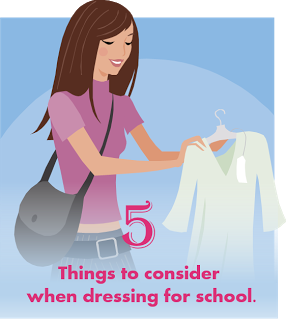Sometimes balancing the professional look of a teacher with the physical demands of the job itself is tricky.
In my music class we run, hop, skip, jump, spin, roll and crawl, bend and reach. Before and after school, I am painting, gluing, glittering, hauling, dusting and de-gunking.
Hardly a day goes by when my clothes are free from the little gifts my students leave for me as they share their sneezy germs and lunch smeared hugs.
And yet, because I am a teacher I am supposed to look nice….. Sometimes I do a better job than other when I’m dressing for school. Personally my taste runs toward fancy, but when faced with the reality of what I do, I’m always at risk of dressing lazily. Somewhere in the middle of fancy and lazy is my goal; what I would term, “realistic professional”…. Everyday I want to wear clothes that will facilitate my ability to do my job. I’m not going to wear a suit, and even though I might wish the powers that be would allow the music teachers to dress like the gym teachers, I’m going to quit trying to find clothes in the athletic department and see if I can find things in my closet that will fit my desire to look my best while allowing me to move as easily as if I were wearing gym clothes. I’m pretty sure this is on my mind because I’m right in the middle of going through my closet, so I am more familiar now with the contents of my closet than I will be until next summer!
One thing I know is that you can’t dress appropriately for being a teacher if you don’t have the right sort of clothes. You also can’t do your job as a teacher if you are always having to think about how to move in your constraining, too tight, too short, too low, too uncomfortable clothes. So here are few things I’m considering as I clean out my closet and re-assess my clothing situation. For this post at least, I’ll consentate on the things that should be AVOIDED!
-
No midriff – If you put your hands in the air and your midriff shows your shirt may not be long enough.
-
No cleavage – If you bend forward and expose ANY cleavage at all you neckline may be too deep.
-
No bra straps – If your bra strap shows your shoulders may be cut too large, or your neck line may be cut too wide..
-
No underarms – If when you put your arms in the air your neighbor can see your underarm, bra band, and/or side – your sleeves may be cut too large, or the bodice may be too big.
-
No tugging – If when you move, your shirt rides up – your shirt may be too tight.
-
No underwear hints – If when you bend or twist you are advertising for your favorite style of underwear by exposing your lower back- your wasitline is too low for work.
-
No hem tripping – If when you walk, hop, skip or run you have to pick up your pant leg, – your hems are too long
-
No puffy pants – If when your pants are buttoned and zipped, you spill over the top, – your pants are too small. A pair of pants that fit, in a size chosen not because of the number on the label but because of how amazing they make you look is a much better choice. Imagine having to ask a student to pick something up off the floor because you are afraid your pants will split…. (horrifying!) Buy a larger size please.
-
No droopy drawers – If you are constantly having to pull your pants up, good for you! You are either loosing weight, OR you just need a belt.
-
No backs of knees – If when you stand straight, the backs of your knees are showing – your skirt or dress will expose your upper thighs when you bend or reach – Can you go an entire day without bending or reaching? at work? really?
-
No upper thighs – If when you raise your hands your neckline dips to expose cleavage OR your hem line exposes your upper thighs – you have a length problem.
-
No transparency. – If you shine a light behind this skirt or dress, can you see the outline of the body? – you have a transparency problem
-
footwear should be comfortable and supportive so that you can reach the end of the day full of energy….. Ask yourself these questions
- jewelry – I bet you wouldn’t be at all surprised to find out that I love dangly earrings. I loved wearing them too until a student accidentally got their finger caught in my long loopy earring during a game….. When I know that I’m going to be engaging in movement activities with my students I get VERY conservative in my use of jewelry. I love wearing the flashy stuff, just not while I’m teaching.
Stages have back-lighting. Skirts and dresses that are worn without slips are transparent – EVEN ones that don’t look transparent from home.
Stages or audiences are often elevated – Your audience will either be looking down on you or up at you. If the audience is looking down, your neckline needs to be more modest. If the audience is looking up, your hemline needs to be more modest.
-
No midriff – If you put your hands in the air and your midriff shows your shirt may not be long enough.
-
No underarms – If when you put your arms in the air your neighbor can see your underarm, bra band, and/or side – your sleeves may be cut too large, or the bodice may be too big.
-
No tugging – If when you move, your shirt rides up – your shirt may be too tight.
-
No underwear hints – If when you bend or twist you are advertising for your favorite style of underwear by exposing your lower back- your wasitline is too low for work.


This is a great post and full of things to consider whether you are teaching or not…just like you said :0).
I agree with your thoughts that most wardrobe mishaps can be avoided with just a little thoughtfulness…as well as a mirror :).
Stopping by from UBC :).
Great Tips, I Give You Sooooooo Much Credit For being A Teacher!! HARD & TIME CONSUMING JOB!!!